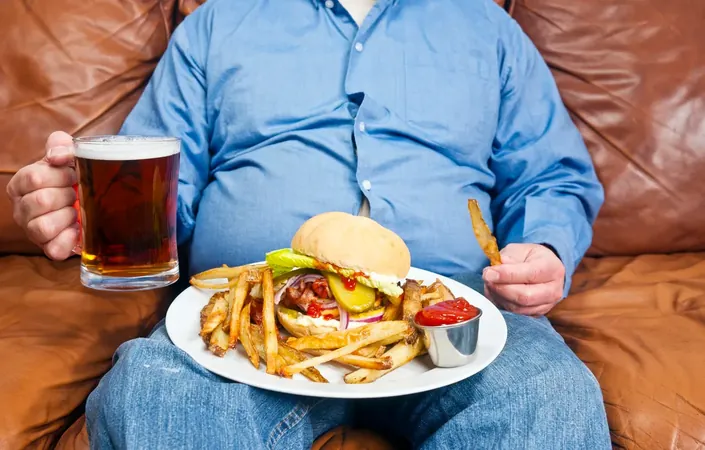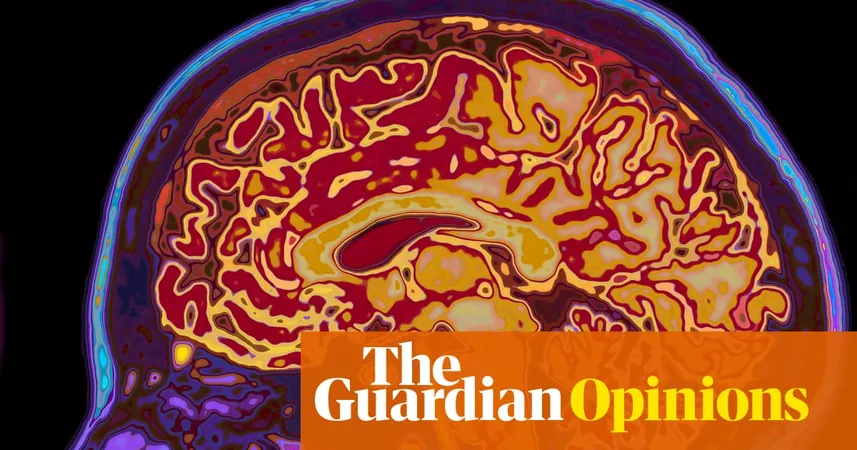
High-Fat Diets Dull the Pleasure of Eating and Fuel Obesity Epidemic
2025-03-30
Author: Benjamin
A delicious bite of salty fries or a spoonful of rich chocolate can elicit joy and satisfaction. However, when indulged in too frequently, the pleasure derived from these treats can diminish dramatically, leading to a troubling downward spiral in eating habits. Recent studies reveal a surprising link: the decline in food-related pleasure may not just accompany obesity—it may actually drive it.
The Fading Joy of Food
Research has shown that our favorite high-fat and sugary foods activate the brain’s reward system, specifically influencing dopamine-producing neurons within the ventral tegmental area (VTA). This natural system encourages repeated behaviors associated with pleasure, like enjoying a slice of cake or indulging in crispy fries. Yet, over time, a diet saturated in fatty foods can mute this pleasure. A groundbreaking study from UC Berkeley indicated that mice fed high-fat diets exhibited reduced interest in calorie-dense snacks, despite these treats being readily accessible.
Curiously, the shift in appetite patterns among these mice raises important questions: why would they lose interest in the very foods contributing to their weight gain?
A Similar Story in Humans
This peculiar finding in mice echoes similar trends observed in humans. Individuals dealing with obesity often report a marked decline in eating enjoyment compared to those of average weight. Brain imaging studies corroborate this, revealing decreased activity in regions associated with pleasure when obese individuals view food.
The Neurotensin Connection
To unravel these mysteries, researchers turned their attention to a lesser-known neurotransmitter called neurotensin. This small protein plays a crucial role in regulating dopamine and thereby influences reward and motivational behaviors.
In a typical scenario, the circuit between the lateral nucleus accumbens (NAc) and the VTA activates the pleasure-driven aspect of eating. However, in mice consuming high-fat diets, this motivational drive diminishes. Even when researchers stimulated this neural pathway artificially, the high-fat diet mice displayed little desire to partake in calorie-rich foods. In contrast, those on normal diets showed a significant increase in appetite for flavorful treats when similar experiments were conducted.
The culprit was identified as reduced levels of neurotensin in the NAc-VTA pathway among the obese mice. This deficiency inhibited dopamine's ability to trigger a robust pleasure response, rendering even the richest foods lackluster.
A Pathway Towards Reversing Changes
Fortunately, the good news is that this neurological adjustment isn't irreversible. When the obese mice were reverted to a normal diet for just two weeks, their neurotensin levels recovered, allowing their dopamine systems to reactivate. They regained interest in high-calorie foods, not from compulsion but through authentic enjoyment.
Further, by leveraging genetic techniques to elevate neurotensin levels, researchers induced not only a renewed enthusiasm for food in the mice but also positive behavioral changes, including weight loss and increased activity levels.
Implications for Human Obesity Treatments
While this research is rooted in mice, it potentially extends to human physiology. Understanding how neurotensin influences dopamine circuitry could lead to innovative obesity treatments that address the root cause of unhealthy eating habits—lack of enjoyment—rather than simply suppressing appetite.
Challenges do exist, as neurotensin impacts multiple brain regions beyond just the reward system, suggesting that direct supplementation could produce unwanted reactions. However, ongoing research aims to delineate specific cellular and molecular pathways altered by high-fat diets, paving the way for targeted interventions.
This approach could stand in contrast to medications like Ozempic, which primarily induce feelings of fullness rather than enhancing the overall pleasure derived from food.
Rethinking Our Relationship with Food
As researchers continue to explore these intricate pathways, critical questions remain: How does starvation impact our dopamine systems? What are the effects on those with eating disorders? The overarching message of emerging research indicates that addressing obesity might not hinge on fighting cravings, but rather on restoring the joy of eating.
Imagine savoring an exquisite dessert in Paris, resulting in a wave of happiness—this dopamine burst is sharply contrasted against the experience of mice on high-fat diets, who often eat out of routine rather than true enjoyment.
This compelling body of research invites us to rethink our approach to food and obesity by proposing that the true danger lies in the loss of eating pleasure, rather than in pleasure itself.









 Brasil (PT)
Brasil (PT)
 Canada (EN)
Canada (EN)
 Chile (ES)
Chile (ES)
 Česko (CS)
Česko (CS)
 대한민국 (KO)
대한민국 (KO)
 España (ES)
España (ES)
 France (FR)
France (FR)
 Hong Kong (EN)
Hong Kong (EN)
 Italia (IT)
Italia (IT)
 日本 (JA)
日本 (JA)
 Magyarország (HU)
Magyarország (HU)
 Norge (NO)
Norge (NO)
 Polska (PL)
Polska (PL)
 Schweiz (DE)
Schweiz (DE)
 Singapore (EN)
Singapore (EN)
 Sverige (SV)
Sverige (SV)
 Suomi (FI)
Suomi (FI)
 Türkiye (TR)
Türkiye (TR)
 الإمارات العربية المتحدة (AR)
الإمارات العربية المتحدة (AR)